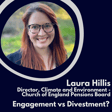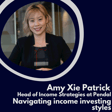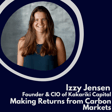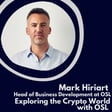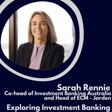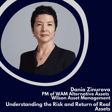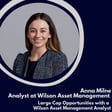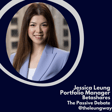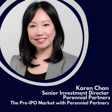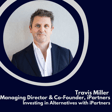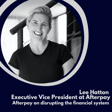Podcast Introduction
00:00:03
Speaker
Welcome back to the Alpha Females Invest podcast, two females working in the finance industry searching for alpha. My name is Emily. And my name is Clooney. And together we bring diversified perspectives from the buy and sell side of the finance world. As usual, any information discussed in this podcast is not financial advice.
00:00:22
Speaker
All opinions reflect those of the individuals and this podcast is for educational purposes only. You should always read the PDS and talk to a financial advisor who can consider your personal circumstances before you invest.
Guest Introduction: Maja Bean Zaman
00:00:35
Speaker
Today, we have Maja Bean Zaman to discuss what she believes will be the biggest investment themes in 2022. Maja Bean has more than 17 years experience in global financial services, the last four years at which she's at City Australia, where she is now head of her investments team. She is also the chair of the Cultural Diversity Committee of Women on Boards,
00:00:59
Speaker
and also lectures at Macquarie University on Financial Services, ESG and Responsible Investing. Welcome to the show, Majevine. Thanks, great to be here. So to start our questions off today, we would love to hear a bit of your career journey and experience working internationally. I know I read a really brief bio then, but we would love you to expand on that and I think it sounds really interesting.
Career Journey and International Experience
00:01:22
Speaker
Well, you know, I've always dreamt of having a banking career when I was just in high school.
00:01:27
Speaker
where I was already searching up, you know, graduate programs. What do I need to do to get into one of them? So naturally my university degrees were centered around banking and finance majors. Now, originally I was working in Singapore and Singapore is a focal point for wealth management and private banking across the region. So travel formed a large part of my work throughout my time there. In fact, I had the opportunity to travel to some really exotic countries such as Sri Lanka,
00:01:55
Speaker
Pakistan, Middle East, South Africa, Indonesia on a very regular basis. In fact, you know, at one point I was going to Jakarta every second week that I eventually picked up the language to better connect with clients. So while I was based in Singapore, working at global private banks such as Deutsche Bank, Koots, Standard Chartered, the experiences I gained were really fabulous, not just with financial markets, but also really, you know, in terms of engaging with a wider portfolio of investors ranging from
00:02:23
Speaker
family offices to sub-institutional clients. Now, back in the day, there was no such conversation around diversity. It was really me seeking out my own path and role models. So I made sure that
00:02:36
Speaker
You know, even now at this stage of my career, I have a great group of mentors around me because, you know, no matter how senior you are, there are always people out there who have seen and done much more than you, which you can learn from. That's great. I love the diversity of your career and the international experience. I think that's something that a lot of our listeners either would dream to do or are jealous of. So it's great to hear that you've had that experience.
00:03:04
Speaker
Marjaveen, I'd love to give our listeners a little bit of background as to your role. So can you explain what does your day-to-day look like and how do you help your
Role at Citi and Global Application
00:03:12
Speaker
clients? Look, in my current role as head of investment specialist at Citi, I am able to use all my global experiences and best apply them to the diverse range of investors based in Australia. Now, a key focus of my team is to really stay across the Australian and global economic environment
00:03:30
Speaker
and be able to translate these investment ideas for our wealth management clients who are predominantly high net worth individuals or families. And given all of that, surely there must be some potentially embarrassing career moments in your past. We ask every single guest on our show to share an embarrassing career moment because we've all had them. So if you don't mind, we'd love to hear one of yours.
00:03:55
Speaker
I would not say embarrassing moment, but more about learning experiences gone wrong. I think the situation in the markets, when you are younger, you're a little bit more brave to take on positions and unhatched positions. And when your positions don't work out the way they should be, clearly you learn really the hard way, just because engaging in those difficult client conversations and the rest
00:04:21
Speaker
So that was something that happened, I guess, during GFC. Clearly nobody knew what GFC was bringing. And then, you know, a lot of clients were taking a lot of risk. And that was, you know, along with the rest of the market, you know, everyone was taking that risk.
00:04:34
Speaker
But then when things turned, you know, I think that's really the art of whether you're in private banking, wealth management is being able to handle that client relationship during difficult times rather than obviously when markets are going great, it's fine. So I think really from then and now, I think, you know, you have more hedging solutions. If somebody is taking more risk, you always also want to consider
00:04:59
Speaker
some protection on the other side, maybe. I think that's a really interesting measurement. I think the point about handling clients in a downturn is a skill that we all aspire to have. You know, it's great to have clients when everything's going gangbusters, but when it all slows down and positioning takes a turn, I think that's where a skill set really comes in handy.
Economic Outlook and Predictions
00:05:18
Speaker
So given we have just kicked off 2022, and gosh, I can't believe we're already in mid-FED, from a top-down perspective, I would love to gain some insight into your outlook for the global economy and markets this year and narrowing into Australia a little bit. Do you think we're in a strong economic position or do you think potentially we're on the brink of a recession? So there are two parts. So I think on a global level, let's really get real.
00:05:44
Speaker
We have seen extraordinary returns in most asset classes on a global level. I mean, you look at global equities, we've seen 28 percent upside last year. Bonds and property, great record performance thanks to loose financial conditions. The reality is that this is not going to last forever. And the magnitude of returns are now going back to a normal pace than seen in the last two years.
00:06:07
Speaker
So this year, we're now shifting from almost an early cycle to a mid-cycle environment where returns are going to be just more modest. Now, more modest or by modest, I actually mean that we're looking at total equity returns to range between 7% to 9%. And overall, from a GDP perspective, we're looking for global growth to be around 3.8%.
00:06:30
Speaker
So that's really how we're positioning for this year. Now, Australia, I think the recent data released in Australia really speaks to the resilience of the economy. Despite the setback in the holiday season due to Omicron, we surely are ready to get closer to what life used to be pre-COVID-19, especially given we've got high vaccination rates across all states. Further, a larger contributor to our exports are actually through services. So we're looking at education and tourism coming back.
00:07:00
Speaker
So I think that number is going to probably support the overall GDP outlook and not forgetting, I guess you probably are following the 4.2% unemployment number we're looking at today, 13 year low and only looking to move towards 3.7 probably end of this year and even lower into next year. So just an amazing labor market followed by very favorable growth prospects.
Macro Drivers for 2022
00:07:24
Speaker
Well, given that background, I guess going a little bit deeper into that, what do you see as the key macro drivers to be watching this year, given that, you know, we may be mid cycle, kind of the threat of COVID does seem to be dwindling. What should we be watching? I think it's going to be an eventful year. There are so many things to watch. I have a list literally I can think of. Number one, the rate of inflation, its impact on demand and supply.
00:07:50
Speaker
Sure, on the supply side of things, we think those disruptions are going to ease down. But I think the demand side of things are going to keep strong. So are we going to get an overshoot or an undershoot? And that really leads on to your central bank policy, right? What are your interest rate differences going to look like? The US is going to go raise rates as soon as they can, but the RBA is sitting tight. So that interest rate differential is going to play out. I guess we also look at China. China's attitude towards managing COVID-19 is completely different to the rest of the world.
00:08:20
Speaker
And that's going to obviously have an impact on their overall growth and the rest. Right now, as we speak, we've got these geopolitical tensions. So you've got Russia, Ukraine, you've got obviously US-China issues, you've got China-Australia issues. So all of these geopolitical tensions are going to continue. And last but not least, elections. Australian elections this year are key.
00:08:43
Speaker
US mid-sum elections are also happening this year. And then we've got the French presidential elections to name a few. So there's a lot happening. So markets are going to be very, very interesting this year. A lot happening, I think, is an understatement. It seems like there's so many different macro drivers going on in all different aspects or around the globe, I should say. Taking that to, I guess, a more investable angle, what do you see as the key investment themes this year? Are there certain themes that you'd like to call out?
00:09:12
Speaker
or that you think people are sort of gradually cottoning onto?
Five Key Investment Themes
00:09:16
Speaker
So we're almost in a, you know, I would say post boom situation. And this is a time where your marathoners outperform the sprinters. So the challenge now is to realign portfolios towards the drivers of sustainable returns and really looking at those long-term leaders. So as a result, we've identified around, you know, around five unstoppable trends.
00:09:39
Speaker
One of them are global healthcare, talking around the aging demographics. Second is digital transformation, which is really 5G and beyond. Three is cybersecurity, protecting the internet's infrastructure.
00:09:52
Speaker
Four is obviously the rise of China. I think China had a rough year last year. Looks like they're coming slowly out of the woods this year. And I think fifth and which you both would definitely agree with is the ESG side of things, which is really investing for the greater good or the greener good.
00:10:09
Speaker
Yeah, and I think going back on your healthcare point, I mean, Australia has been an aging population for some time. And I think, you know, that has been an investment theme that has been playing out. What do you think are the particular segments of healthcare that are investment considerations for, you know, your clients or for people listening to this podcast? Look, let's look at the numbers, right? So today, one out of every 11% in the global population is aged above 65.
00:10:38
Speaker
Now in 2050, or roughly you said 30 years from now, this number is going to change to one in every six, which I know will include me, right? So one in every six person is going to be in the aging population group. So what does this mean? Imagine the weight on the health infrastructure, right? That's going to be 30 years from now. So I think you need to focus on areas which support
00:11:03
Speaker
these type of trends where your health infrastructure will probably be a key beneficiary. You can also look for pharmaceutical companies which come up with new treatments for chronic and life-threatening conditions, which you get when you get old. I think that's one segment of healthcare that we like. The other segment that we also like is the technological advances in care. So obviously, with the lockdowns and the social distancing measures, we have seen lots of technology like telemedicine, remote diagnosis,
00:11:32
Speaker
is a big area that we like, which is basically med tech and not forgetting wearable devices that people wear. That's another area we can also look at. That's really interesting. I think it would definitely be a miss of me not to ask a few further questions about your China investment theme. There is continuous press about China and the geopolitical tensions associated with China.
00:11:56
Speaker
Maybe firstly, in your view, can you just briefly summarize the issues and I guess your view on whether you see them being resolved this year? Look, China is the second largest economy in the world. And where they stand today, I mean, I think just as the US is tightening rates to manage their inflation, China is probably just the only major country that's easing. And that is a screaming opportunity.
00:12:21
Speaker
So adding China to a portfolio today really presents another way to diversify your portfolio because China presents lower policy risk, given that they've started easing the East in January this year. There are several reasons why we are positive on China. Number one, Chinese equities are more related to their domestic credit conditions, which means as China eases their interest rates, Chinese equities do well. They are not correlated to US monetary policy. So that's a plus.
00:12:51
Speaker
Second, China has a much more favorable inflation picture. Their domestic demand is improving, but we don't see material inflation at all in China. Number three, since December where China had the Central Economic Work Conference in December, inflows in Chinese equity ETFs have risen by around $30 billion, which is huge. And finally, when we look from a valuation perspective, MSEI China is still around 38% cheaper than the S&P 500.
00:13:21
Speaker
So there is an opportunity there. Now, yes, last year they were focusing on moving towards common.
00:13:29
Speaker
social economic prosperity, and there were multiple clam downs, especially in the property sector, which was widely telecast in media. But what we're seeing now is that regulators have actually used state-owned asset management companies in China to now get involved, restructure those developers, purchase stalled projects, and buy those bad loans. And this, coupled with the easing policy, probably go hand in hand for some value on the upside here.
00:13:58
Speaker
Majibin, you just mentioned that there's obviously a better easing environment in China, and you just touched on it then, but I do feel there's a real pushback from a volatility perspective in terms of the quickness with which China can implement regulation or take regulation away. Do you agree with that? And I guess second to that, how do you think China plays a role in the investment world in the future? Investors, you mentioned that they should look to allocate to China at this stage.
00:14:26
Speaker
Do you have a certain proportion of their portfolio that you think is a safe bet to a degree? First of all, I think the diversification is key when you have a portfolio. So there is going to be an allocation to the US,
China's Economic Position
00:14:38
Speaker
to Europe, to UK, to Asia. Now, when we come to the Asian side of things, China is always usually the bigger piece of that allocation. Now, that's one way of looking at it. The other way of looking at it is when we look at the size of the Chinese companies in terms of the market caps,
00:14:55
Speaker
they're very comparable to what we see in the U.S. And that's why I feel like it's a market you just can't ignore going forward. Now obviously those clam downs and you know they're moving towards a new model in China but that's now I think it's all sort of priced in already. It's not a surprise, right? We know they have these five-year plans, it's all documented and if anything I think this is something again that would
00:15:24
Speaker
bring balance into the economy in terms of the gap between the rich and the poor. And for example, in the education sector, they wanted to make it more affordable for just everyone, right? So I think it would promote competition internally, which would probably be more beneficial.
00:15:40
Speaker
Great. Thanks for that. That was really interesting. Cybersecurity was another theme that you called out. I know that on the start, the onset of the pandemic, we did have in Australia a state-based cybersecurity attack. We've seen a number of companies come out
00:15:57
Speaker
saying that they have been subject to cybersecurity crimes, I guess, and that does have material financial consequences. So what have you been seeing around the cybersecurity theme? And I mean, I think we've seen that COVID's accelerated, but how and why and what sectors are most at risk and does it present any investment opportunities?
00:16:19
Speaker
Yeah, I think this is an area which I think really needs to be of great focus going forward. And the reason for that is, I mean, just looking at the numbers, global e-commerce reached around $26 trillion in 2020. And this magnitude of activity that's happening online creates an equal opportunity for cyber criminals, right?
00:16:41
Speaker
So the theft of data and assets online really represents a major economic threat. Now, I mean, I was just reading some research, external research, and what they said was that the annual impact of cybercrime today is $6 trillion and could reach $10 trillion in the next few years. So, I mean, all of these statistics really drive with the fact that, you know, when you interview some of the top CIOs and you ask them what their priorities are,
00:17:08
Speaker
I think over 60 to 70% said that their number one priority was cybersecurity. So what does that all mean? That all really means that going forward, you're going to have more investment in this space, more money put into such companies for protection, right? Because the cost of cybercrime is not just what data is stolen. It comes with reputational damage. Think about Equifax and a few other companies over the past years, many years, where you had data leaks. Obviously, if you have a government system that's hacked,
00:17:38
Speaker
That's your threat to national security. And obviously, if your network is not secure enough and you have these leakages or these hacks, you may actually have regulatory sanctions as well. You know, just because you're not protecting data well enough. So all of these factors really point to the fact that going forward, beneficiaries of increasing expenditure in this area will be really firms that are focused on cloud. So prepare newly created data.
00:18:06
Speaker
and also firms that help secure the internet of things, which means, you know, I guess the industrial machinery that I embedded with sensors and connected with the internet via 5G, things like that will be key beneficiaries of this theme.
00:18:21
Speaker
There's some really interesting stats on cybersecurity, and I personally had no idea how much of a monetary impact it's having quite frankly on companies and the world globally.
Trends in ESG Investing
00:18:32
Speaker
I think that theme aligns quite well with your other investment theme, which is focused around ESG. Now, most of our listeners know that we've previously spoken to a few ESG gurus, our co-host being one of them.
00:18:47
Speaker
But from your perspective, what is the next ESG trend or theme that you think is really going to take off this year and why? So, look, I think over the past decade, we've seen obviously positive development in ESG. I mean, tripling of financing flows, and you would agree flows in ESG funds have increased tenfold since 2015. More than three-quarter of the global nations are committed to the net zero commitments post-COP26.
00:19:16
Speaker
And obviously 90% of the power plants built in the last year were either solar or wind. So that's great. So the focus on climate change is now greater than ever. And the thing is that while green energy is already cheaper than various forms of fossil fuel, I think in terms of where to invest within this space, we are really focusing on developers of new technologies that enhance energy efficiency and reduce emissions. We also look at
00:19:45
Speaker
the space where you have users of energy in each area, which will either have to adapt their operating processes by embracing new technology or face business extinction. So they're forced to move. So some of today's heaviest greenhouse gas emitting sectors represent the most promising areas for disruption. Now, from an investment screening perspective, obviously lower emitters have shown to outperform.
00:20:10
Speaker
And that's really seen from the carbon allowance opportunity. This is, I guess, bigger in Europe right now. Carbon allowance are obviously central to the drive to manage climate change. But interestingly, the demand and the price of carbon allowances in Europe have risen almost 150% year over year. So this is clearly an additional cost of business for businesses. And it can affect portfolios. Because what we have seen is that the recent outperformance
00:20:40
Speaker
really been from low carbon intensive companies. So, bottom line, this is likely to lead to greater investment in clean energy and greater energy efficiency so that they don't have to pay the other costs that are associated with emissions. Couldn't have said it better myself. I think that we're going to continue to see a green premium. We have seen low cost of capital for higher ESG performing stocks, including in the green energy thematic. So, I think that's absolutely spot on.
00:21:10
Speaker
What is a really interesting conversation and more so emerging is the increase in ESG and sustainability from Asia. You know, it is partly driven by regulation and China recently committing to net zero. Given your experience in Asian markets, what's the current state of play for ESG in Asia and how might this influence Australian investments? Interestingly, you know, of course, China, India, everyone has joined the bandwagon.
00:21:40
Speaker
And if you haven't joined the bandwagon as a country, you're probably the odd one out. So that's really what it has come to. And I think that's a big development that we have seen over the past years. Now, in terms of implementation, obviously, in countries where you are key exporters of commodity oil and things like that, and your government revenues are driven by these exports. And that's predominantly, I would say, your emerging markets or your Asian markets, some of them.
00:22:10
Speaker
Of course, that transition is going to take longer, and there has to be a significant budget assigned to it. Also, you need to have that expertise, right? Clearly, I think, from my perspective, the Europeans are probably the champions in this space in terms of policy, implementation, and everything. Everyone else is still playing catch-up. So, I think, yes, Asia is definitely on the bandwagon, especially the bigger economies. You have China and India committed, but
00:22:38
Speaker
as they have committed 2050, 2060, 2070, they will take time to get on to participate in a bigger way.
00:22:46
Speaker
Yeah, I think that's a really interesting point. And I think Australia is definitely playing a bit of catch up versus not only Europe, but a few other countries now too, as you mentioned. Great. And it would be rude of us to end before asking you what you want to tell our listeners on your top investment tip.
Investment Tips and Strategies
00:23:05
Speaker
With that, I guess I can think of a few, but I'll make it quick. Number one, I guess, do not try to time the market.
00:23:13
Speaker
I think far more money has been lost trying to wait for that correction to come, which never comes. It's all about time in the market, not timing the market. Second, I think, as I have seen and I have learned as well over the years, stay invested if your position allows you to. Keep your emotions in check. At the peak of the pandemic, we saw some panic selling where investors locked in losses. Now, in hindsight, if we look back, if only they remained calm, remained invested,
00:23:41
Speaker
there would be in a much better situation today. And finally, obviously, it should be on top of every investor's mind. Do not take more risk than you can handle. Stay within your limits, with risk limits, especially if you're new to investing and trading. And finally, this is something which you could agree or disagree. But apart from keeping aside emergency funds for unforeseen circumstances, which we all can have,
00:24:08
Speaker
Having a large pool of cash is not a great idea, given that inflation and taxes can destroy its value. So cash is not king. And as we have seen in the past decade, cash has been a drag on returns. And we estimate that in 10 years' time, every dollar that remains uninvested has and will see its purchasing power shrink to 80 cents. So something to think about there.
00:24:32
Speaker
I definitely think I'm going to start thinking about time in the market, staying invested, keeping your emotions in check, and staying within your risk limits are all really critical to the investment world.
Diversity in Finance
00:24:44
Speaker
It's also pretty clear that you're an advocate for diversity.
00:24:48
Speaker
Why is that so important, including both from a gender perspective, which is obviously a big focus here at Afrofemales, but also from a cultural perspective as well? Look, I think ensuring diversity in your team and in the companies you invest in is crucial for long-term success. And this goes beyond gender, but also includes, as you said, culture and background and the like. Now, the bottom line is that you get
00:25:13
Speaker
diversity of thought and out-of-the-box thinking, which really results in long-term solutions for clients and better returns in the companies that we invest in. Now, I am really proud and happy to work for a company that really embodies this. Now at Citi, more than 50% of our global workforce is female, including more than 40% female representation in the leadership team. Interestingly, 56% of our new hires in 2021 at Citi
00:25:41
Speaker
Australia or female. Now this diversity within our business is important as we work with clients, well clients from different cultures being an international bank. And diversity is really not about getting it right 100% of the time. Diversity is about really being committed to the journey and taking steps towards change. So one thing I would also like to add is like diversity forms part of our clients ESG commitments as well.
00:26:08
Speaker
So Citi's global footprint means that we are uniquely positioned to partner with local clients on this journey. It's clear you've got a real passion for diversity there. And I think the concept of taking steps towards change is critical. Could you just elaborate a little bit as to your own experience as a woman in finance and how you think that does lead to better investment performance?
Women in Finance and Diversity Advocacy
00:26:31
Speaker
Sure. So let's start with gender diversity first.
00:26:35
Speaker
You know, I've always been in a client facing sales role. So back in the day, I guess 20 years ago, it was common for me to be the only woman in a team or the only woman on a business trip with male colleagues and only meeting male clients. So being able to have a voice in a male-dominated environment was quite a challenge. However, over the years, you find your way through that by literally raising your voice in the room.
00:27:02
Speaker
making sure you're heard and of course saying something credible. So of course you need to make sure you know your stuff. Now over the years, it is wonderful to see that this dynamic is now changing. Now, obviously I'm no longer the only woman in the room. More importantly, I am actually working with a sizable number of investors who are also female. So that's the gender side of things from a cultural perspective. Now throughout my career in Asia, Middle East, and now in Australia, I've been fortunate to work with individuals from culturally diverse backgrounds.
00:27:31
Speaker
Now, the benefits of these diverse perspectives and thought leadership in the workplace not only drive creativity, but also makes your business more competitive and leads to better outcomes. I'm really proud to say that my team is culturally and gender diverse, and we enjoy the capabilities of having a multilingual team catering to the diverse set of the clients that we interact with. This diversity of thought really allows us to better understand, you know, the cultural importance of succession planning,
00:28:01
Speaker
planning for the family's education, healthcare, retirement, you know, the value systems differ. One thing I would also like to say is that the key element of managing cultural diversity in a team or in an organization is that first we must recognize the differences because there are, respect them and reconcile them. So once you're across these three elements, the diversity of inputs that go into an investment process without doubt would lead to better outcomes.
00:28:29
Speaker
Now, interestingly, not forgetting when we talk about ESG investing, this piece falls in that S element. Now, while we know that, you know, a low score on this S element with lack of diversity will not support an organization's ESG ratings or also not support their, you know, the organization's share price in the long run. What is interesting is I wonder when fund managers' ratings will actually include
00:28:57
Speaker
the disclosure of diversity, not in the stocks that they invest in, but within their own portfolio teams. We're actually seeing that play out quite a lot and getting questions on that more and more. So I think you're on the money
Career Advice and Mindset
00:29:11
Speaker
there. Now, before we end our podcast, we always like to ask our speakers one final question, which is, can you please provide us with your top career tip?
00:29:21
Speaker
Look, a couple of things come to mind, right? I guess first is getting that mindset right. Work with great people, do good things. But, you know, I think for myself, right, I keep reminding myself things I need to improve on. And one of them is really to learn, to listen and become a good listener. Because when you're in a room, you want to be the best voice, not the first voice, right? So that's the first thing. The second one, I think,
00:29:47
Speaker
You know, with your career, we all have a final outcome, final destination where we aspire to go. It probably looks like a dream right now. I mean, where I want to go, it really does look fuzzy and dreamy far away right now, but take some time, start to figure out how can I get there? What do I need to do? So this really involves reflecting on where am I now? Where do I want to be? And how do I get there? And once you know your path, it's either do or don't. There's no such thing as try.
00:30:17
Speaker
With the right mindset, there's no limit to how much you can achieve. And last but not least, which I think is a little bit more common for us females. We all have an inner critic inside of us, that little voice in our head that tells us whenever we're in a difficult position or facing a challenge, we turn away. You're not good enough with this. Just leave it. You know, it's not worth it. Well, you know what? Try to work on yourself. Find your inner coach instead.
00:30:43
Speaker
So instead of thinking negative thoughts, think about it like this. I can add value here. I'm here for a reason. People want to hear from me. I can do better. So I think if you can make the voice of your inner coach louder than your inner critic.
00:30:56
Speaker
I think that that's the way to go. Mahaj Bean, that was fantastic advice that I think Clooney and I can both take away some tips from that. And we really enjoyed our conversation with you today on the themes to watch for 2022. I think that it's going to be a really interesting and potentially turbulent year ahead. So we can definitely check back in and see how your predictions played out over the years. But otherwise, thank you so much for joining us. We really enjoyed our conversation today.
00:31:26
Speaker
Thank you for having me. It was wonderful to chat. Thanks, Marjabin.
Podcast Conclusion
00:31:30
Speaker
Thank you for listening to the Alpha Females Invest podcast. If you like this episode, we would love your support on Instagram. You can find us at Alpha Females Invest. You could also leave a podcast review, but most importantly, please keep listening. See you next time.




